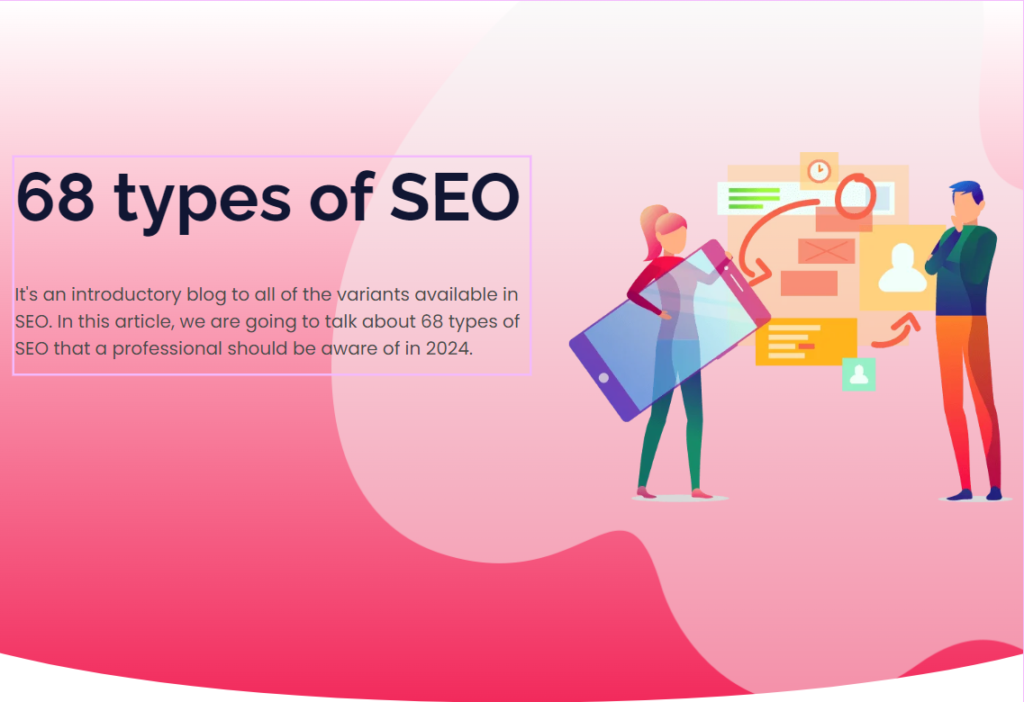Search Engine Optimization (SEO) is the art and science of enhancing a website’s visibility on search engines. With the ever-evolving digital landscape, SEO has diversified into multiple branches, each catering to different needs and challenges. Below is an exploration of 68 distinct types of SEO, covering everything from the basics to highly specialized techniques.
Core Types of SEO
- 1. On Page SEO : – On-Page SEO focuses on optimizing the content and HTML source code of individual pages to rank higher in search engines. It includes strategies like keyword optimization, meta tags, internal linking, and content quality.
- 2. OFF Page SEO : – Off-Page SEO revolves around activities performed outside your website to improve its ranking. This mainly involves building high-quality backlinks from authoritative websites.
- 3. Technical SEO : – Technical SEO refers to optimizing the infrastructure of your website to help search engines crawl and index it more effectively. It includes optimizing site speed, mobile-friendliness, XML sitemaps, and fixing crawl errors.
Technical SEO
- 1. Mobile SEO : – With the growing number of mobile users, Mobile SEO ensures that your website provides a seamless experience across all devices, especially smartphones.
- 2. Accessibility SEO : – Accessibility SEO focuses on making your website accessible to everyone, including users with disabilities. This involves optimizing alt texts, captions, and using ARIA attributes.
- 3. Edge SEO : – Edge SEO is a modern approach that leverages Content Delivery Networks (CDNs) and serverless functions to optimize performance at the edge of the network, enhancing speed and security.
- 4. JavaScript SEO :- JavaScript SEO involves optimizing websites that heavily rely on JavaScript frameworks. It ensures that search engines can properly crawl and index JavaScript content.
- 5. React SEO :- React SEO is the practice of optimizing React-based websites for search engines, ensuring that the dynamic content generated by React is indexed correctly.
- 6. Next JS Seo :- Next.js SEO focuses on optimizing websites built with the Next.js framework, leveraging its server-side rendering capabilities for better SEO performance.
- 7. Headless SEO :- Headless SEO involves optimizing websites where the frontend is decoupled from the backend. This requires special strategies to ensure that content is properly crawled and indexed.
Content SEO
- 1. Landing Page SEO : – Landing Page SEO involves optimizing specific landing pages to convert visitors into customers while ensuring they rank well in search results.
- 2. Blog SEO : – Blog SEO is the process of optimizing your blog posts to rank higher on search engines, using tactics like keyword research, internal linking, and content formatting.
- 3. Content SEO : – Content SEO is all about creating high-quality, relevant, and engaging content that resonates with your audience and ranks well on search engines.
- 4. Semantic SEO :- Semantic SEO focuses on the intent behind search queries, optimizing content to match the context and meaning rather than just keywords.
- 5. Multimedia SEO :- Multimedia SEO involves optimizing images, videos, infographics, and other media types to enhance visibility in search results.
Local & International SEO
- 1. Local SEO : – Local SEO aims to optimize a website to rank better for location-based searches. This is crucial for businesses that operate in specific geographic areas.
- 2. International SEO : – International SEO focuses on optimizing your website for multiple countries and languages, ensuring that your content reaches a global audience.
- 3. Multilingual SEO : – Multilingual SEO involves optimizing content in different languages, catering to a diverse audience while maintaining consistent rankings across regions.
Platform – Specific SEO
- 1. Ecommerce SEO :- E-commerce SEO is the practice of optimizing online stores to rank higher in search engines, focusing on product pages, category pages, and overall site structure.
- 2. YouTube SEO :- YouTube SEO involves optimizing videos for YouTube’s search engine, focusing on video titles, descriptions, tags, and engagement metrics.
- 3. App store SEO :- App Store SEO (ASO) is the process of optimizing mobile apps to rank higher in app store search results, driving more downloads.
- 4. Amazon SEO :- Amazon SEO focuses on optimizing product listings on Amazon to increase visibility and sales, utilizing keyword research and product description optimization.
- 5. Etsy SEO :- Etsy SEO is the process of optimizing listings on Etsy to improve visibility and sales, focusing on tags, titles, and descriptions.
- 6. Shopify SEO :- Shopify SEO involves optimizing your Shopify store to rank higher in search engines, including strategies for product pages, blogs, and overall site structure.
- 7. Squarespace SEO : – Squarespace SEO focuses on optimizing websites built on the Squarespace platform, leveraging its built-in tools and adding custom SEO elements.
- 8. WordPress SEO :- WordPress SEO involves optimizing websites built on WordPress, using plugins like Yoast SEO and optimizing content, permalinks, and images.
- 9. Wix SEO :- Wix SEO is the practice of optimizing websites created with Wix, using its SEO tools to improve site visibility on search engines.
- 10. Social media SEO :- Social Media SEO involves optimizing your social media profiles and content to improve visibility in search engine results.
- 11. YEP SEO :- YEP SEO refers to the strategies used to optimize content on the YEP (Your Experience Platform), focusing on user engagement and experience.
- 12. News SEO :- News SEO is the practice of optimizing news articles and websites to rank higher in search engine results, particularly for time-sensitive content.
- 13. Google Discover SEO :- Google Discover SEO involves optimizing content to appear in Google’s Discover feed, focusing on engaging and timely content.
- 14. Marketplace SEO :- Marketplace SEO focuses on optimizing your listings on various online marketplaces to improve visibility and sales.
- 15. Google SGE SEO :- Google SGE (Search Generative Experience) SEO is a specialized form of SEO focused on optimizing content for Google’s AI-driven search experiences.
- 16. Datafeed SEO : – Datafeed SEO involves optimizing product feeds for better visibility in search engines and shopping platforms.
- 17. TikTok SEO :- TikTok SEO focuses on optimizing your content on TikTok to increase visibility and engagement, making it easier for users to discover your videos.
Specialised types of SEO
- 1. Image SEO :- Image SEO involves optimizing images for search engines, including proper file names, alt texts, and image compression.
- 2. Video SEO : – Video SEO is the process of optimizing videos to improve their ranking on search engines, focusing on video metadata, transcripts, and engagement.
- 3. Programmatic SEO : – Programmatic SEO is the use of automated tools and techniques to optimize a large volume of web pages, often for e-commerce and content sites.
- 4. Holiday SEO : – Holiday SEO involves optimizing your website and content specifically for holiday-related searches, driving seasonal traffic and sales.
- 5. Featured snippet SEO : – Featured Snippet SEO aims to optimize content to appear in Google’s featured snippets, providing quick answers to users’ queries.
- 6. Long-tail SEO : – Long-Tail SEO focuses on optimizing content for longer, more specific keyword phrases that are less competitive but highly targeted.
- 7. Saas SEO : – SaaS SEO is the process of optimizing Software as a Service (SaaS) websites to rank higher in search engines, focusing on product features, user needs, and competitive keywords.
- 8. Enterprise SEO : – Enterprise SEO involves managing and optimizing large-scale websites with thousands of pages, often requiring sophisticated strategies and tools.
- 9. Niche SEO : – Niche SEO focuses on optimizing content for specific, often less competitive, market segments, targeting highly specific audiences.
- 10. Voice SEO : – Voice SEO is the practice of optimizing content for voice search, focusing on natural language and conversational queries.
- 11. AI SEO : – AI SEO leverages artificial intelligence and machine learning to optimize websites and content, predicting trends and automating tasks.
- 12. Taxonomy SEO : – Taxonomy SEO involves organizing content into well-structured categories and tags to improve navigation and search engine visibility.
- 13. Barnacle SEO / Parasite SEO : – Barnacle SEO involves leveraging the authority of larger websites to rank your content higher, often by posting content on established platforms.
- 14. Syndicated SEO : – Syndicated SEO focuses on distributing content across multiple platforms and ensuring it ranks well in search engines despite being duplicated.
- 15. SEO FOR academic journals SEO : – SEO for Academic Journals involves optimizing scholarly articles and research papers to improve visibility in academic search engines like Google Scholar.
- 16. Advanced SEO : – Branding SEO ensures your brand appears positively in search results by optimizing branded keywords and managing online reputation.
- 17. Branding SEO (Brand SERP) : – Branding SEO, also known as Brand SERP (Search Engine Results Page), focuses on optimizing how your brand appears in search engine results.
- 18. Podcast SEO : – Podcast SEO involves optimizing your podcast titles, descriptions, and transcripts to increase visibility in search engines and directories.
- 19. Forensic SEO : – Forensic SEO diagnoses and resolves issues that cause drops in search rankings or traffic by conducting thorough audits and fixing problems.
- 20. Travel SEO : – Travel SEO focuses on optimizing travel-related content, local searches, and mobile accessibility to attract travellers and boost bookings.
- 21. B2B SEO :- B2B SEO targets business clients by optimizing for industry-specific keywords, creating authoritative content, and generating leads.
- 22. B2C SEO : – B2C SEO aims to attract and convert consumers through high-volume keywords, engaging content, and optimized e-commerce pages.
- 23. Paywell SEO : – Paywall SEO optimizes paywalled content to rank well in search engines by providing previews and leveraging headlines and summaries.
SEO Philosophies
- 1. White Hat SEO : – White Hat SEO involves using ethical, sustainable SEO practices that comply with search engine guidelines, focusing on long-term results.
- 2. Black Hat SEO : – Black Hat SEO refers to unethical practices that aim to manipulate search engine rankings, often resulting in penalties or bans.
- 3. Grey Hat SEO : – Grey Hat SEO is a mix of White Hat and Black Hat techniques, where the boundaries of ethical practices are pushed but not crossed entirely.
- 4. Negative SEO : – Negative SEO involves using malicious tactics to sabotage competitors’ rankings, such as creating spammy backlinks or duplicating content.
- 5. Sustainable SEO : – Sustainable SEO focuses on long-term strategies that build a strong foundation for continuous growth and stability in search rankings.
- 6. Continuous SEO : – Continuous SEO is the practice of regularly updating and optimizing your website to maintain and improve search engine rankings over time.
- 7. DIY SEO : – DIY SEO involves individuals or small business owners optimizing their websites on their own, using readily available tools and resources.
- 8. Holistic SEO : – Holistic SEO is a comprehensive approach that considers all aspects of a website, from content and design to technical factors, to create a well-rounded strategy.
- 9. Hustle Bra SEO : – Hustle Bra SEO focuses on aggressive, fast-paced SEO tactics, often requiring significant effort and time investment to achieve quick results.
- 10. Search Experience Optimization SEO : – Search Experience Optimization (SXO) combines traditional SEO with user experience (UX) strategies to create a seamless, enjoyable experience for users while improving search rankings.
SEO is a vast and multifaceted field, with each type serving a unique purpose in enhancing your website’s visibility and performance. Whether you’re focusing on content creation, technical optimizations, or specialized strategies, understanding and implementing these different types of SEO can help you achieve your digital marketing goals.


